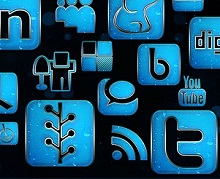 By John Stonestreet | Is Technology Making Us Less Us? | Facebook, Twitter, texting, email, video chats, sharing—the number of channels we use to communicate today is staggering. The amount of time we spend accessing these channels is increasing daily, and some of us have more online “friends” we’ve never met than the number of people our grandparents actually knew in their entire lifetimes.
By John Stonestreet | Is Technology Making Us Less Us? | Facebook, Twitter, texting, email, video chats, sharing—the number of channels we use to communicate today is staggering. The amount of time we spend accessing these channels is increasing daily, and some of us have more online “friends” we’ve never met than the number of people our grandparents actually knew in their entire lifetimes.
We’re living in a new reality—where we can share intimate details of our lives, argue about politics, sports or religion, enjoy the same entertainment, and fall in love—all without ever meeting each other face-to-face.
Now, thanks to a team of researchers at MIT, we can even give physical affection remotely. The researchers created an inflatable vest that links to your Facebook account and “hugs” you every time someone “likes” something you’ve posted. Well, while we may not see many inflatable hug-vests hitting the streets in the near future, this invention is a perfect symbol of how the rise of social media is deeply—and some say permanently—changing our relationships.
Dr. Sherry Turkle, a specialist in technology and society, also at MIT, is one of those people. She believes all of this virtual friendship is falling woefully short of the real thing. In fact, she says, it’s leaving us less human. Turkle has spent years researching the ways technology changes people, and has written a book entitled “Alone Together,” in which she describes the disturbing trends.
“These days we expect more from technology than we expect from each other,” she explained in a TED talk recently. “Technology appeals to us where we are most vulnerable. We’re lonely, but we’re afraid of intimacy. And so from social networks to sociable robots, we’re designing technologies that will give us the illusion of companionship without the demands of friendship. We turn to technology to help us feel connected in ways we can comfortably control. But we are not so comfortable. We are not so in control,” she says.
This illusion of control, Turkle says, leads to some unexpected consequences. In a recent Wall Street Journal piece, Elizabeth Bernstein argues that one of these consequences is how we’ve become incredibly rude on the internet. We say things from behind the safety of our keyboard we’d never say face-to-face. And new studies suggest that our self-control actually deteriorates proportionately with our time online.
The devices on our desks and in our pockets, in Turkle’s words, “change our hearts and minds.” They offer what she calls “gratifying fantasies,” fantasies that give us the impression that we can fully control our relationships. But by trying to replace the vulnerability, the intimacy, the conflict and messiness of actual friendships with electronic substitutes, we diminish part of what it means to be human.
Parents, it is crucial that we help students thoughtfully and intentionally develop authentic relationship skills in this online age.
My friend Andy Braner, president of Camp Kivu and a thoughtful observer of youth culture, says that loneliness is the ironic epidemic of this over-connected age, and students are longing to be truly known and truly connected. His book, Alone, is must-reading for anyone wishing to mentor students in our disconnected networked age. So, spend a little deliberate time connecting with friends and family the old-fashioned way. You know—without the text-lingo, the friend requests, or the inflatable vest.












